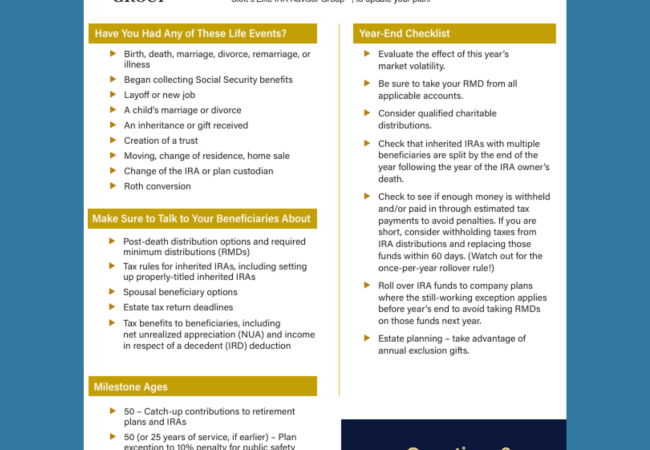- Retirement
- Navigating Medicare IRMAA: Strategies To Minimize Medicare Premiums
Navigating Medicare IRMAA: Strategies To Minimize Medicare Premiums

You turn 65 and begin Medicare insurance. Looking at the monthly cost and think that is not so bad. You can easily look up how much your payment is going to be for Part B and Part D. Medicare may cost you a lot more than you imagined!
What is IRMAA?
Welcome an unfriendly additional premium called IRMAA or income-related monthly adjustment amount. Basically, the more you make, the more you pay. Medicare looks back at your income two years ago to determine the price you will pay for parts B and D. So income in the year you were 63 determines how much more you will pay when you are 65. The calculation is based on your modified adjusted gross income or MAGI.
So, what income counts for MAGI? Almost everything counts, including tax-free municipal bond income, wages, Social Security benefits, and retirement account distributions. Understanding what counts towards MAGI allows you to predict your IRMAA charges and find ways to reduce them.
Please Note: If you have MAGI that is as little as $1 over the threshold limit, then you must pay the full adjustment. There are actually five different levels of income with five different levels of additional premium. The levels differ with single or jointly filed tax returns. At the most punitive level of income, an additional $419.30 for Part B and $81 for Part D must be paid per month per individual!
How to Avoid Additional Premiums
There are a number of strategies available to help you avoid IRMAA adjustments.
- Roth Conversions: Qualified Roth withdrawals: are tax-free and do not count toward MAGI for Medicare purposes. So consider Roth conversions now!
- Qualified Charitable Distributions or QCDs: QCDs allow each IRA owner to donate from their IRA straight to charities with a limit of $105,000 per year. The IRA owner must be at least 70.5 years of age at the time of the QCD. So, you might consider a QCD if a Required Minimum Distribution pushes you over the MAGI limit. You should consider making a QCD from your IRA if you are over age 70.5 and are giving to charities, including your church. This donation is probably not tax deductible if you claim the standard deduction on your tax return.
- Control your dividend and interest income in after-tax accounts: Perhaps use asset location to put your more interest- and dividend-producing investments in your tax-deferred accounts, thereby limiting your taxable dividends and interest.
- Income Shifting: Transfer income to family members with lower earnings. For instance, gifting assets or investments to children or grandchildren who fall into lower tax brackets can reduce your taxable income and help you remain under IRMAA thresholds. Be sure to understand the gift tax rules and annual limits to ensure this strategy is both beneficial and compliant.
- Deferring Income: Another tactic involves postponing income to manage your MAGI more effectively. This might include delaying withdrawals from retirement accounts or arranging with your employer to defer bonuses or other forms of compensation until a year when your income is lower. Deferring income using tax-advantaged accounts like Traditional IRAs or 401(k)s until retirement can be highly advantageous.
- Utilizing Health Savings Accounts (HSAs): Contributions to HSAs are tax-deductible, which can reduce your MAGI. Withdrawals for medical expenses that qualify are tax-free. By maximizing your HSA contributions, you lower your taxable income while saving for future healthcare needs, providing dual benefits.
- Tax-Loss Harvesting: This technique involves selling investments at a loss to counterbalance gains from other investments. By carefully managing your portfolio and leveraging losses to your advantage, you can decrease your taxable income and potentially avoid higher IRMAA thresholds
Common Mistakes to Avoid with IRMMA
Steer clear of these common errors to prevent higher premiums:
Lack of Planning: Many people overlook IRMAA when making financial decisions, which can result in unexpectedly high Medicare premiums. It’s essential to include IRMAA considerations in your overall financial planning to avoid surprises.
Overlooking Income Sources: Not accounting for all sources of MAGI, such as tax-exempt interest from municipal bonds, can lead to miscalculations and higher charges. Ensure you have a comprehensive understanding of what contributes to your MAGI to accurately plan your finances.
Neglecting Regular Reviews: Financial and tax situations can change yearly, and failing to regularly review and adjust your plans can result in higher IRMAA charges. Regularly assess your income, investments, and potential changes in tax laws to stay below the IRMAA thresholds.
Improper Timing of Roth Conversions: Timing your Roth conversions incorrectly can lead to higher income in a single year, pushing you into a higher IRMAA bracket. Plan conversions over multiple years to spread out the tax impact and avoid large spikes in your MAGI.
FAQs About IRMAA and Medicare Premiums
1. Is there a way to reduce Medicare premiums? How can you minimize IRMAA?
Reducing Medicare premiums involves managing your Modified Adjusted Gross Income (MAGI) to stay below IRMAA thresholds. Effective strategies include Roth IRA conversions, Qualified Charitable Distributions (QCDs), and tax-loss harvesting. Deferring income or shifting it to lower-income family members can also help. Regularly reviewing your financial situation allows you to adapt to any changes and stay within the lower IRMAA brackets, ultimately minimizing the impact on your monthly premiums.
2. What is the two-year rule for IRMAA?
The two-year rule for IRMAA refers to how Medicare uses your Modified Adjusted Gross Income (MAGI) from two years prior to determine your current premiums. For example, your 2022 income will affect your 2024 Medicare premiums. Understanding this lag is crucial for effective financial planning and income management to avoid unexpected charges.
3. How do I challenge Medicare IRMAA?
If you’ve had a major life event that has greatly decreased your income, you can contest Medicare IRMAA by submitting an appeal. Significant life events that qualify include getting married, going through a divorce, the death of a spouse, or retiring. To appeal, complete the Social Security Administration form SSA-44 (Medicare Income-Related Monthly Adjustment Amount – Life-Changing Event) and provide the necessary documentation to support your claim.
4. What income level triggers higher Medicare premiums? Do you understand 2024 IRMMA rules?
Higher Medicare premiums are triggered when your Modified Adjusted Gross Income (MAGI) exceeds specific thresholds set by Medicare. For 2024, the income levels that trigger IRMAA are as follows:
- Individuals with a MAGI of less than $103,000 and married couples filing jointly with a MAGI of less than $206,000 will not pay IRMAA.
- Individuals with a MAGI between $103,000 and $129,000 and married couples filing jointly with a MAGI between $206,000 and $258,000 will face an IRMAA of $244.60 for Part B and $12.90 for Part D per month.
- Individuals with a MAGI between $129,000 and $161,000 and married couples filing jointly with a MAGI between $258,000 and $322,000 will face an IRMAA of $349.40 for Part B and $33.30 for Part D per month.
- Individuals with a MAGI between $161,000 and $193,000 and married couples filing jointly with a MAGI between $322,000 and $386,000 will face an IRMAA of $454.20 for Part B and $53.80 for Part D per month.
- Individuals with a MAGI between $193,000 and $500,000 and married couples filing jointly with a MAGI between $386,000 and $750,000 will face an IRMAA of $559.00 for Part B and $74.20 for Part D per month.
- Individuals with a MAGI above $500,000 and married couples filing jointly with a MAGI above $750,000 will face an IRMAA of $594.00 for Part B and $81.00 for Part D per month.
Let Us Help You Navigate IRMMA and Medicare Premiums
Schedule a meeting with lead advisor Chris Robinson, ChFC to discuss your IRMAA and other IRA questions.
Disclaimer
Financial Success Doesn’t Happen by Chance.
Contact lead advisor Chris Robinson with RFG Wealth Advisory in Argyle, Texas to discuss your questions.
RFG Wealth Advisory is an independent, fee-only Registered Investment Advisor firm in Argyle, Texas. At RFG Wealth, our fiduciary duty ensures your interests always come first, and we maintain a transparent fee structure for your peace of mind. Contact us today!
Investment advice is offered through RFG Wealth Advisory, a Registered Investment Advisor.
Schedule a Virtual ConsultationChris Robinson is the managing partner and founder of RFG Wealth Advisory, which he founded in 1995. He is a current resident of Argyle and native of Denton, Texas.
- Chris Robinsonhttps://rfgwealthadvisory.com/author/chris-robinson/
- Chris Robinsonhttps://rfgwealthadvisory.com/author/chris-robinson/
- Chris Robinsonhttps://rfgwealthadvisory.com/author/chris-robinson/
- Chris Robinsonhttps://rfgwealthadvisory.com/author/chris-robinson/
Related Posts
“These materials have been independently produced by RFG Wealth Advisory. RFG Wealth Advisory is independent of, and has no affiliation with, Charles Schwab & Co., Inc. or any of its affiliates (“Schwab”). Schwab is a registered broker-dealer and member SIPC. Schwab has not created, supplied, licensed, endorsed, or otherwise sanctioned these materials nor has Schwab independently verified any of the information in them. RFG Wealth Advisory provides you with investment advice, while Schwab maintains custody of your assets in a brokerage account and will effect transactions for your account on our instruction.”
RFG Wealth Advisory is a registered investment adviser with the U.S. Securities and Exchange Commission (SEC). Registration does not imply a certain level of skill or training, nor is it an endorsement by the SEC or other regulators. RFG Wealth Advisory only provides investment advisory services in jurisdictions where it is registered or qualifies for an exemption. This website is for informational purposes only and does not constitute legal, tax, or accounting advice. For more information, see our Form ADV and Form CRS, available at the bottom of this page.
RFG Wealth Advisory
130 Old Town Blvd., S, Ste. 100
Argyle, TX 76226





